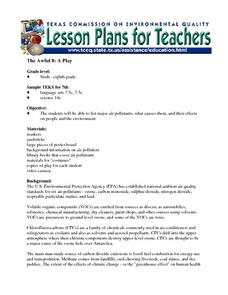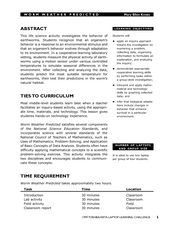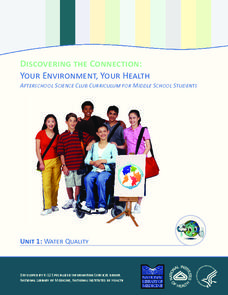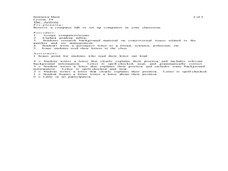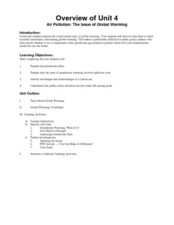Curated OER
Need vs. Wants in Creating Sustainable Communities
Ninth graders create a T chart of their needs and wants. In this environmental science lesson, 9th graders brainstorm ideas on how to create a sustainable community. They decide what they would give up and keep to make the community...
Curated OER
What the Community Can Do
Students examine how the EPA encourages communities near Superfund sites to become involved in the Superfund process. They read informational text, and participate in a role-play activity.
Curated OER
Exploring the Elements of Stewardship
Students examine stewardship activities and issues relating to the Department of Energy's activities on the Oak Ridge Reservation. They identify seven elements of an effective stewardship program, and conduct Internet research.
Curated OER
Economics for Leaders Performance Assessment
High schoolers participate in a scenerio in which they are assessed on the material in previous lessons. In groups, they prepare a presentation based on their solutions to the given problem. They develop their critical thinking skills...
Curated OER
The Lincoln-Douglas Debates of 1858: Interactive Map Activity
Students utilize an interactive map to explore the 1858 Senate campaign in Illinois. They examine how factors such as population, transportation, and party strongholds can affect campaign strategies. Students write an essay discussing...
Curated OER
Stewardship of Yosemite National Park
Middle schoolers devise a plan that would be true to John Muir's spirit of stewardship toward Yosemite. They analyze a core map to determine the original plan and usage of the park and compare the original plan to a current park map.
Curated OER
Life Systems - Plant Growth
3rd graders will participate in a variety of tasks which help them to understand the basic concepts of plant growth. Research and reporting skills are developed as they gather information from various sources related to the use of plants...
Curated OER
Gender Role Development
Students look in newspapers and magazines and discuss gender role development and stereotypes. For this gender lesson plan, students bring in their favorite objects that have no gender stereotype linked to it.
Pulitzer Center
Food Insecurity
Food insecurity, whether as a result of food scarcity or a lack of nutritious food, is a growing and serious problem in the world today. After discussing the concept of food insecurity, learners listen to an NPR radio broadcast on the...
Curated OER
Where Should It Go? Recycle? Compost? Incinerate? Landfill?
Students discuss what happens to trash after it is collected. They sort "clean" trash into groups depending on whether it should be recycled, incinerated, placed in a landfill, composted or if it is something we could avoid using.
Curated OER
Trash City
Students work together to build a trash city. They collect items that would go into a landfill to help them build their city. They discuss ways to cut down on garbage.
Curated OER
The Awful 8: A Play
Students perform a play that presents the causes and effects on people and the environment of the eight major air pollutants.
Curated OER
Worm Weather Predicted
Students examine worm habitats. In this animal habitats lesson plan, students participate in a lab activity that requires them to explore the adaptations that earthworms make to their environment.
Curated OER
Estuary Interviews
Young scholars role play as newscasters to highlight the lives of estuary animals. In this estuary animal lesson, students watch local new shows to examine how interviews take place. They research the lives of animals that live in...
National Library of Medicine
Your Environment, Your Health: Water Quality
How important is water quality where you live? The first module in a six-unit series includes four lessons on water quality. By applying the concept directly to the lives of pupils, they engage in meaningful learning. They read about...
National Library of Medicine
Your Environment, Your Health: Chemicals in Your Home
Many people know about chemical pollution, but are all chemicals bad? The third unit in a series of six addresses chemicals common in everyday life. Scholars learn about the chemicals found in their own homes, chemical safety, and...
Curated OER
My View's Write!
After researching issues involving panthers, middle schoolers practice writing persuasive letters. They become familiar with a controversial issue related to panthers and write their position on the issue. This lesson...
National History Day
“Saving the Bear”: The Russian Expeditionary Force of World War One
How have Russian politics affected countries on a global stage? The discussion of the Russian Revolution and World War I begins with an analysis of primary resource letters. Learners finish with a project where they create a timeline of...
Curated OER
Air Pollution: The Issue of Global Warming
Here is an outstanding 10-page lesson plan on global warming. Learners discover that there is a lot of controversy surrounding this topic in that the science behind global warming is difficult to prove. The best thing about this plan is...
Curated OER
Deep Blue Sea
Elementary schoolers identify the ocean floor in a geological sense. They create a presentation that highlights the key features of the ocean floor. This terrific lesson plan has excellent streaming video segments embedded in it, and the...
National Library of Medicine
Your Environment, Your Health: Air Quality
Some scientists argue that air pollution now causes more deaths than smoking. The second unit in a six-part series focuses on air quality. Scholars learn what's in the air, how clean the air around their school is, and what they can do...
National Library of Medicine
Your Environment, Your Health: Runoff, Impervious Surfaces, and Smart Development
Can a sidewalk increase the amount of pollution in local streams? Scholars learn the answer to this question though research and experimentation in the fifth unit in the six-part series. Pupils study runoff, impervious surfaces, and the...
Curated OER
Ecosystem Lesson Plan: Food Chain/Food Web
Learners discuss ecosystems, eliciting their current knowledge of an ecosystem. Students receive an Ecosystems document and look at the picture. Learners brainstorm connection between the cover picture and ecosystems. The indicated...
Curated OER
An Exploration of Cradle-to-Cradle Design Thinking
Introduce cradle-to-cradle design thinking. Scholars first discuss the importance of natural laws and rights. They then use a variety of online and print resources to research eco-efficiency and cradle-to-cradle design.











